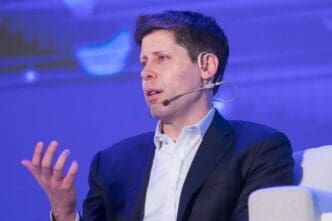As the advertising industry stands on the cusp of a technological revolution, artificial intelligence (AI) is poised to transform the landscape, raising significant questions about the future of creativity and human involvement. According to recent discussions among industry leaders, AI’s integration into marketing is not a question of if, but when.
Sam Altman of OpenAI recently stated that AI could soon handle 95% of marketing tasks, signaling a dramatic shift for the advertising world. Leaders in the field are grappling with the challenge of blending AI with human creativity to maintain the magic that human touch brings to brand communication.
Sam Balsara, chairman of Madison World, argues that resisting AI in an attempt to preserve jobs is misguided. He suggests that the real opportunity lies in harnessing AI alongside human ingenuity to create a vibrant partnership. “To resist AI to save your job is the surest way of losing it,” Balsara asserts, advocating for a synergy between technology and human creativity.
Siddharth Shakdher, chief marketing officer at Paytm, highlights AI’s potential to turn regulatory challenges into opportunities. By leveraging AI for compliant advertising, industries heavily regulated by compliance frameworks, such as finance and pharmaceuticals, can find innovative ways to communicate effectively. “AI can create compliant advertising,” Shakdher notes, emphasizing the role of AI in transforming regulation into creativity.
Josy Paul, chairman of BBDO, envisions new roles emerging in the industry, such as ’emotion engineers’ and ‘story whisperers,’ essential for maintaining the cultural and emotional depth of advertising in the digital age. Paul views the future as a dance between logic and creativity, where AI enhances human capabilities rather than replacing them.
While AI accelerates content creation and helps produce advertising at unprecedented volumes, industry veterans like Pratik Shetty from Flipkart remind us of the irreplaceable value of human creativity. The subtle nuances and emotional resonance that make ads memorable still require a human touch.
The advertising industry is undergoing a fundamental transformation, with smaller teams producing more work through AI-augmented workflows. The shift allows for rapid iteration and experimentation, moving beyond traditional campaign models.
Notably, the advertising ecosystem of big countries is well-positioned for this transition, leveraging its technical talent and cultural richness to amplify storytelling. The challenge lies in using AI to enhance rather than homogenize creative efforts, celebrating local nuances and cultural specificities.
As AI technology continues to evolve, the advertising world finds itself at a crossroads. The future belongs to those who can integrate AI with human creativity, guiding it with wisdom and cultural understanding to create powerful, emotionally resonant communication. The journey ahead is not just about surviving AI but using it to enrich human creativity and connection in advertising.








